Hillary Clinton looks to tie GOP candidates to Trump’s rhetoric about Muslims
By the numbers
Welcome to Trail Guide, your host through the wilds of the 2016 presidential campaign. It's Tuesday, Dec. 8, and here's what we're talking about:
- Hillary Clinton says Trump is "articulating" what GOP candidates believe about Muslims
- Trump's call to ban Muslims pushes the political debate far beyond usual bounds of discourse, the Times' Mark Z. Barabak and Kurtis Lee write
- Analysis: Ignoring Trump didn't work for Republicans. What now?
- Trump's rivals for the GOP nomination also denounce his idea
- A pro- Jeb Bush ad attacks the national security credentials of Trump, Ted Cruz and Marco Rubio
- Bernie Sanders travels to Freddie Gray's Baltimore neighborhood as he seeks connection with black voters
A cantankerous Democratic debate took place Saturday night
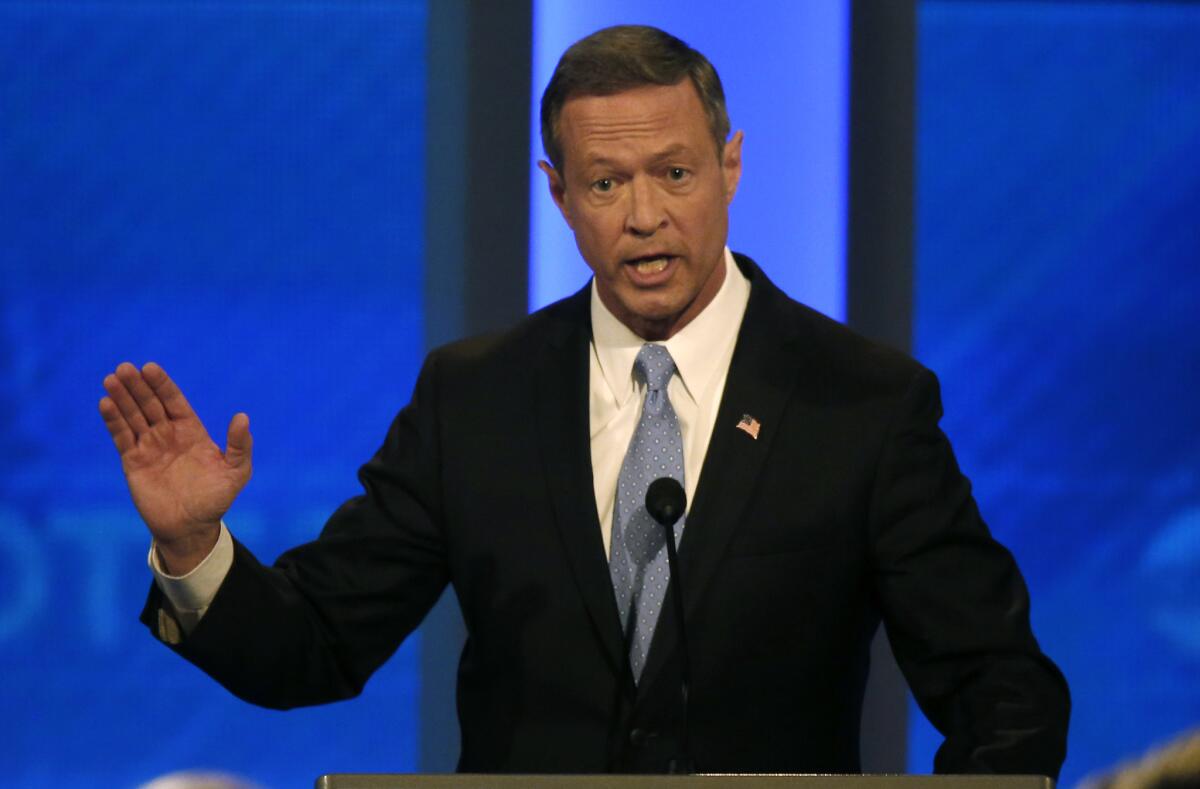
Martin O’Malley speaks during a Democratic presidential primary debate Saturday, Dec. 19, 2015, at Saint Anselm College in Manchester, N.H. (AP Photo/Jim Cole)
Hillary Clinton looks to tie GOP candidates to Trump's rhetoric about Muslims
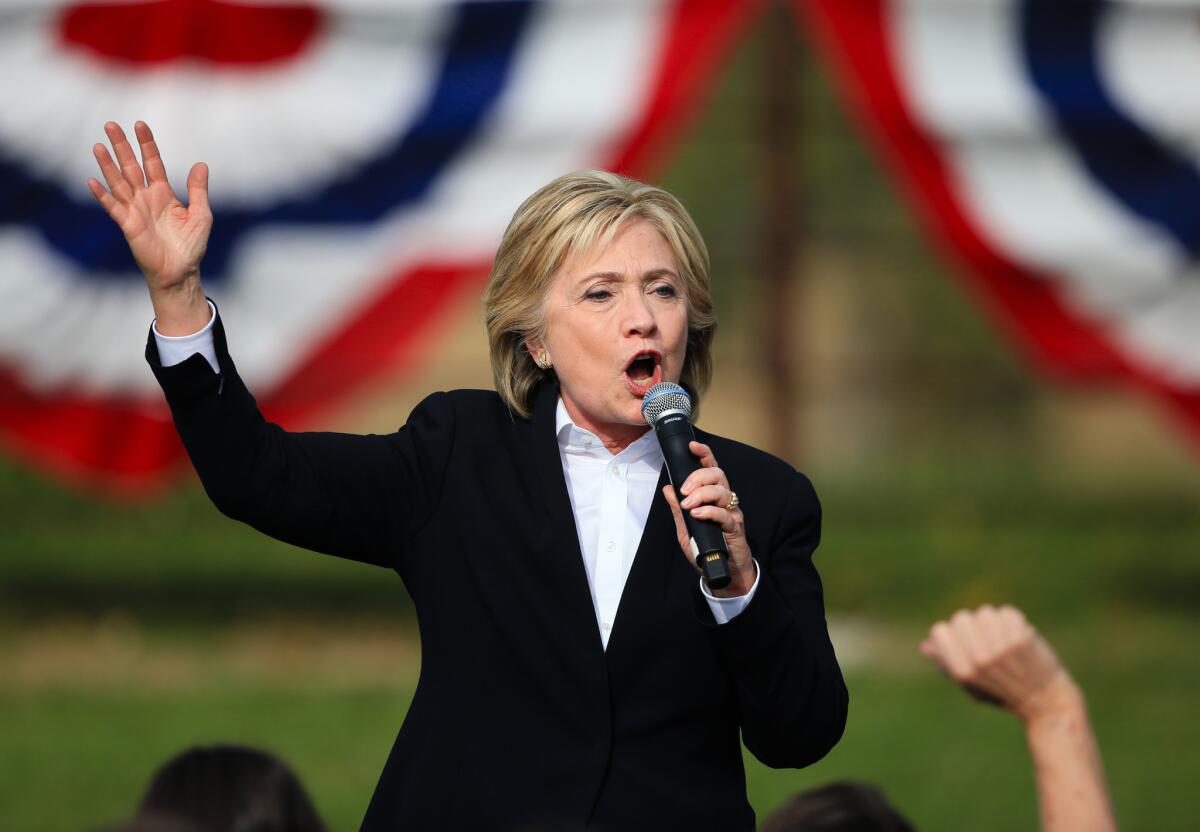
Democratic presidential candidate Hillary Rodham Clinton speaks Oct. 7 during a campaign stop at the Westfair Amphitheater in Council Bluffs, Iowa.
Democratic front-runner Hillary Clinton is pushing back against Republicans trying to distance themselves from Donald Trump’s caustic anti-Muslim comments, highlighting what she calls similarly divisive rhetoric from other GOP presidential hopefuls.
“When you take a step back and see what the Republican field as a whole says about Muslims,” it’s not just Trump making inflammatory statements, Clinton wrote in an essay Tuesday.
“It’s hard to take seriously their attempts to distance themselves from Mr. Trump,” writes Clinton. “He’s just articulating the logical conclusion of what the rest of them have been saying.”
Retired neurosurgeon Ben Carson, one of the Republican contenders, has said he doesn’t think a Muslim should be allowed to become president, Clinton noted. Moreover, she wrote, the widespread use of the phrase “radical Islamic terrorism” by Republicans is offensive to the religion. (The White House and each of the three Democratic presidential hopefuls avoid using the phrase in part to avoid alienating Muslims, including the leaders of several crucial U.S. allies in the Middle East.)
“This kind of rhetoric sets us back in the fight against radical jihadists — a fight we absolutely have to win, against a brutal, nihilistic enemy who twists Islam to justify mass murder,” wrote Clinton, the former secretary of State.
Since Trump called Monday for a ban on Muslims entering the United States, a majority of the Republican presidential field condemned his proposal.
“Unhinged,” Jeb Bush, the former Florida governor, said of Trump in a Twitter message. “Ridiculous,” New Jersey Gov. Chris Christie said in a radio interview.
But some, such as Texas Sen. Ted Cruz, have avoided criticizing Trump.
"A lot of our friends here have encouraged me to criticize and attack Donald Trump. I’m not interested in doing so,” Cruz said Tuesday.
Frank Luntz, a Republican strategist who has conducted focus groups on Trump’s supporters, said Tuesday that candidates like Cruz hesitate to criticize Trump because they don’t want to alienate potential supporters in the months ahead.
“When and if Trump implodes, those like Cruz want to nab his supporters,” Luntz said. “You can’t seem to attack voters when attacking or offering criticism of a rival candidate, especially when that candidate is the front-runner.”
In seeking connection to black voters, Bernie Sanders travels to Freddie Gray's neighborhood
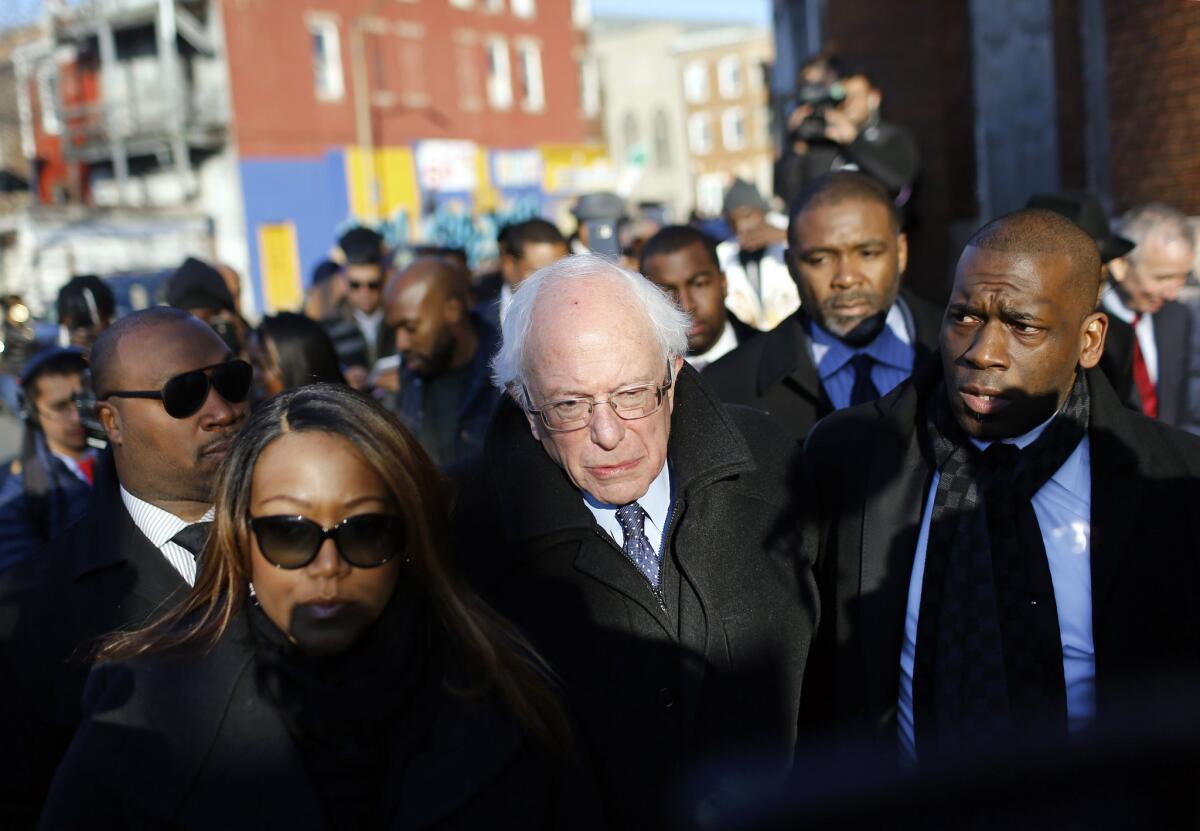
Democratic presidential candidate, Sen. Bernie Sanders, I-Vt., center, walks alongside the Rev. Jamal Bryant, right, during a walking tour of the Sandtown-Winchester neighborhood of Baltimore, Tuesday, Dec. 8, 2015. The Democratic candidate was touring the neighborhood of Freddie Gray, who died last spring of a spinal injury he suffered while in police custody, touching off riots. (AP Photo/Patrick Semansky)
It's a nagging issue for Vermont Sen. Bernie Sanders’ campaign: How does he broaden his appeal in the Democratic primary to include more than his base of college-educated white liberals?
So on Tuesday, Sanders and his wife, Jane, traveled to a predominantly black neighborhood in Baltimore to make inroads with a community that knows little about him, surveys have shown.
The backdrop for Sanders’ visit was the area once home to Freddie Gray, a 25-year-old who died last spring after his spine was partially severed while he was in police custody. Following the release of video that showed Gray’s limp body being dragged into a police van, weeks of unrest ensued in Baltimore. Six officers were charged in his death; all pleaded not guilty.
Sanders visited with a handful of black pastors at a community center named in Gray’s honor to talk about issues including mass incarceration, the militarization of police, college affordability and so-called food deserts.
While speaking about police reform, Sanders emphasized the need for police departments to be more reflective of the communities they serve.
During their meeting, Sanders, who trails Hillary Clinton in most polls for the Democratic nomination, was told by one of the pastors that many children in the community simply do not trust police.
“How do we change the mind-set?” the pastor asked.
“The federal government can play a role in showing what a good police department could be,” Sanders said. He’s called for federal funds to require body cameras for law enforcement officers to make it easier to hold them accountable and national training standards so officers are mandated to follow certain procedures in unison across the country.
On the campaign trail, Sanders has enlisted Cornel West, a prominent black philosopher and activist, to help appeal to African Americans, a key voting bloc in the Democratic presidential primary.
While police reform has been a pillar of Sanders' campaign, his chief issue is income inequality.
“It is very expensive to be poor,” Sanders said Tuesday, noting, for example, a lack of access to grocery stores, which are nonexistent in Gray’s neighborhood.
“It probably costs more to eat here,” Sanders said. “What are you supposed to feed your kids? Potato chips?”
Analysis: Why ignoring Donald Trump hasn't worked well for Republicans
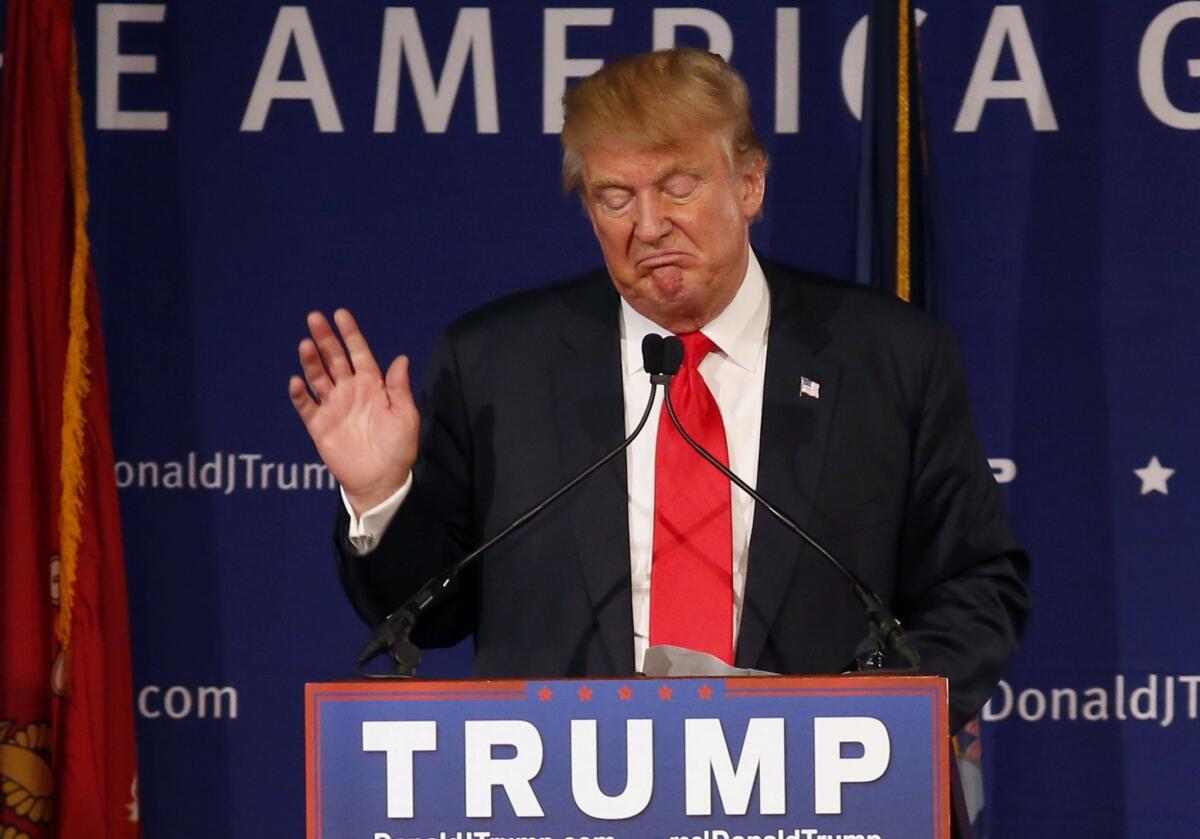
Republican presidential candidate Donald Trump, speaking at a rally at the USS Yorktown in South Carolina on Monday, defended his proposal to ban Muslims from entering the country.
So now Republicans know that hoping it will all go away is not a successful strategy against Donald Trump. That raises a tough question: What, if anything, will work?
The difference between the party's — and its presidential field's — more tentative approach to earlier Trump insults and the near-universal outrage that greeted his demand that all Muslims be barred from entering the country seemed to rest on a sense that Trump has maneuvered from politically disadvantageous territory to a place freighted with danger, whether for the Muslims he is characterizing as threatening or to the United States' strategic imperatives abroad.
Like most of Trump’s policy declarations, there was little to explain how he would do it, what the ramifications would be and how exactly it comported with the mores of a nation formed on religious freedom.
That aside, his latest bout of rhetorical exuberance left leading Republicans aghast and many of the party's presidential candidates in a squeeze. They have ignored or halfheartedly waved off insults uttered by Trump since the beginning of his campaign against such key voter groups as Latinos and women. Even as his past remarks posed the potential of a mammoth problem for the party in 2016, many candidates were disinclined to confront him in any meaningful and persistent way.
Despite Trump's blatant insults, many candidates also promised to support him should he win the nomination.
Expert on Donald Trump's Muslim plan: 'It's an attack on the very foundation of the United States'
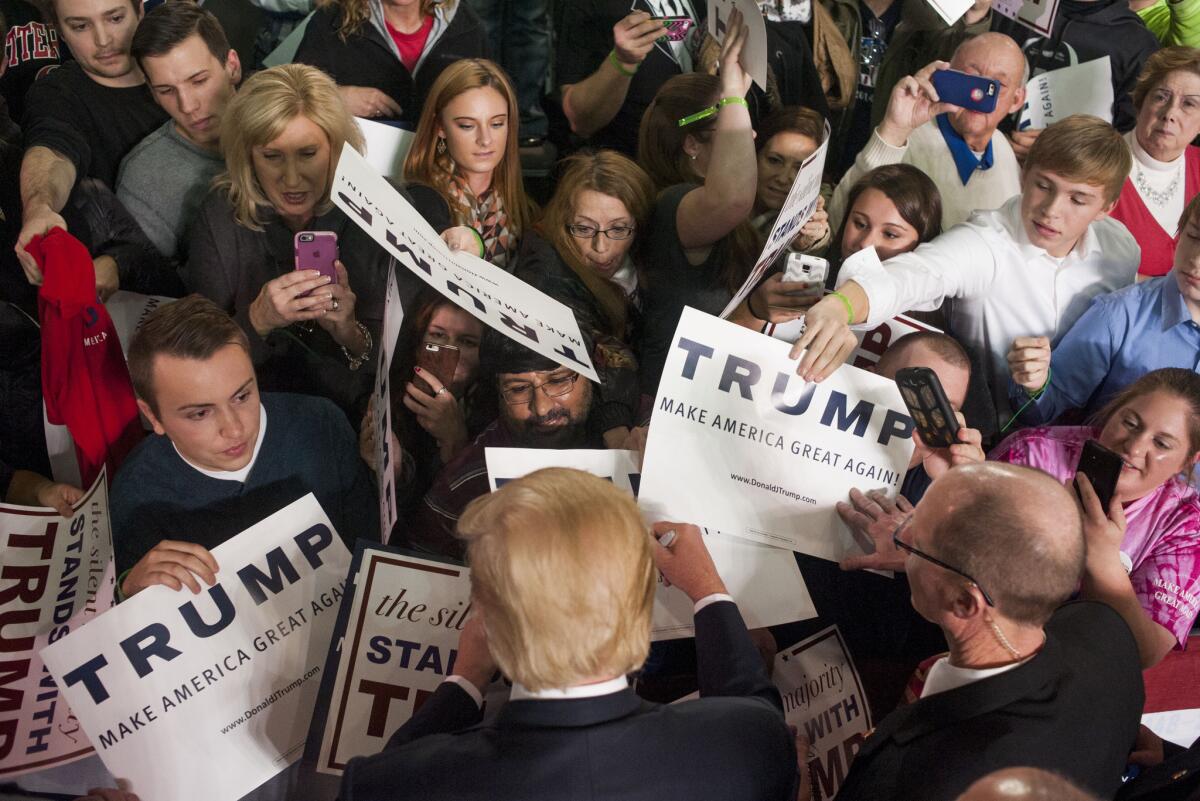
Donald Trump shakes hands and signs autographs with his supporters after speaking at a campaign rally at the Greater Columbus Convention Center in Ohio on Nov. 23.
When Donald Trump escalated his provocative rhetoric with a proposal to ban Muslims from entering the United States, it was not only condemned as divisive and racist, but also dismissed by many who questioned whether he would have the legal authority as president to impose the policy.
The short answer: No.
And it’s a standard Trump strategy, where in an effort to incite his supporters, he offers ideas that as president he could not implement on his own.
For Trump to make statements as if “in a snap it can happen” is just not reality, said Edwin Smith, a professor of law and political science at the University of Southern California.
“Clearly, it’s not how democracy works,” he said, noting that it would require an act of Congress, which has authority to create laws, to ban Muslims from entering the United States. And even if that far-fetched scenario were to occur, such a law "would face tremendous legal hurdles if passed,” said Smith, noting that it could then be overturned by the Supreme Court if found to conflict with the Constitution.
The proposal appears to violate both the First Amendment guarantee of freedom to practice religion and the Constitution’s equal protection clause, legal experts say.
"It is blatantly unconstitutional and it's an attack on the very foundation of the United States," Marci Hamilton, a law professor at Yeshiva University, told the Associated Press.
Since the terrorist attacks in Paris last month, and last week’s massacre in San Bernardino, in which one of the attackers allegedly pledged allegiance to Islamic State, Trump’s campaign has focused largely on what he has described as the threat to the United States from the extremist group.
In addition to calls for a ban on Muslims entering the United States, Trump noted he’s open to shuttering mosques, saying there’s “absolutely no choice” -- another proposal that would be in violation of the First Amendment.
Many of his Republican challengers, including Sen. Lindsey Graham of South Carolina, have denounced Trump's rhetoric and said Trump is not offering realistic proposals to combat terrorism.
“I want to talk to the Trump supporters for a minute. I don't know who you are, and I don't know what you like about this,” Graham, a foreign policy hawk, told CNN on Tuesday, calling himself “disgusted” and adding that Trump is “a race-baiting, xenophobic, religious bigot.”
In several polls from early nominating states, such as Iowa and New Hampshire, Trump continues to lead the crowded GOP field.
White House decries Trump's proposal as 'morally reprehensible'
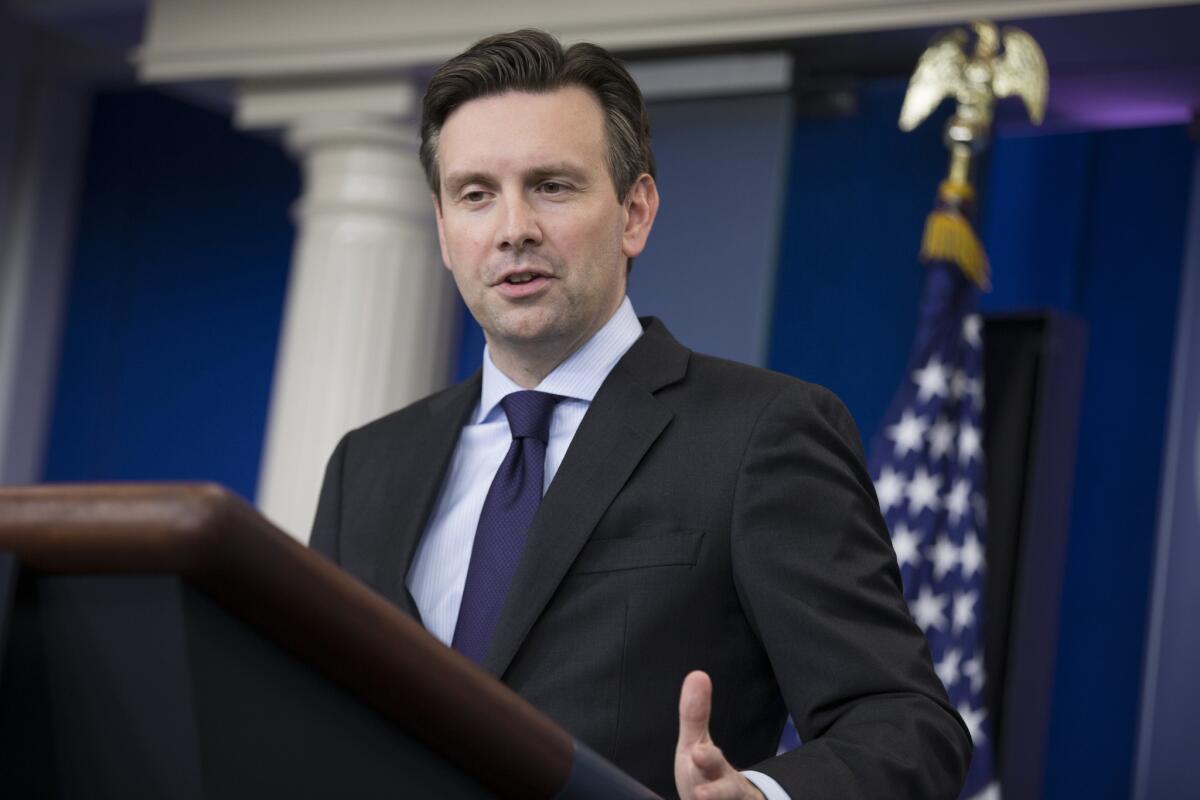
White House Press Secretary Josh Earnest answers a question about Republican presidential front-runner Donald Trump during Earnest’s daily press briefing on Tuesday in Washington.
The White House weighed in Tuesday on Donald Trump’s call for a ban on Muslim immigration, saying it made him unfit to serve as president and challenging Republicans to condemn his rhetoric or risk being “dragged into the dustbin of history” with him.
Speaking to reporters at his daily briefing, White House Press Secretary Josh Earnest called Trump’s comments “morally reprehensible” and said they ran “counter to the Constitution.”
But he also portrayed Trump’s proposal as only the latest episode of the “whole carnival-barker routine we’ve seen for some time now.”
Even as Republicans denounce Trump, they won't rule out backing him as nominee
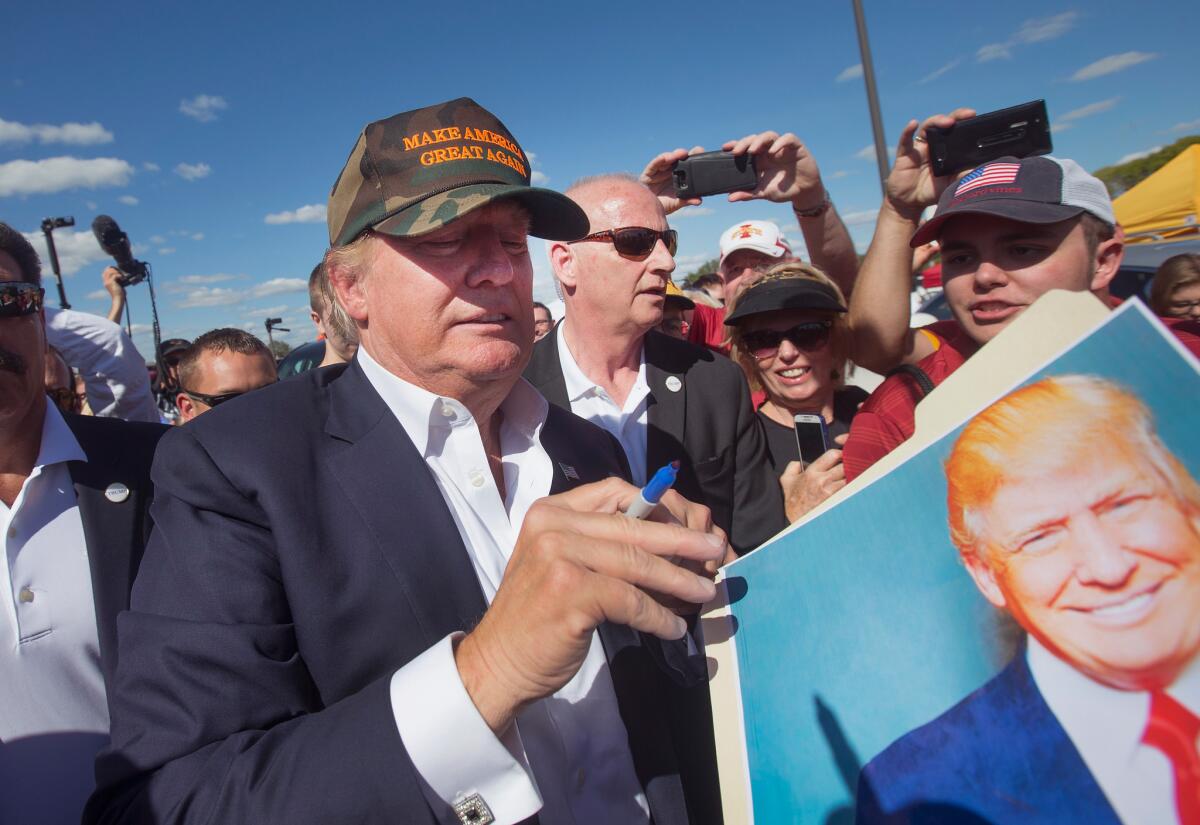
Republican presidential candidate Donald Trump campaigns in Iowa in September.
Facing a hail of criticism from Democrats and Republicans alike, Donald Trump on Tuesday reiterated his call for a religious test barring Muslims from entering the United States as a way, in his view, to prevent future terrorist attacks.
"You're going to have many more World Trade Centers if you don't solve it -- many, many more and probably beyond the World Trade Center," the Republican presidential candidate said in a CNN interview, referring to the Sept. 11, 2001, attacks.
The condemnation of Trump’s exclusionary initiative, which began within moments of its unveiling Monday, gathered strength as more prominent Republicans, among them House Speaker Paul Ryan, weighed in.
Ted Cruz backs away from criticizing Trump, introduces his own plan to limit refugee entry
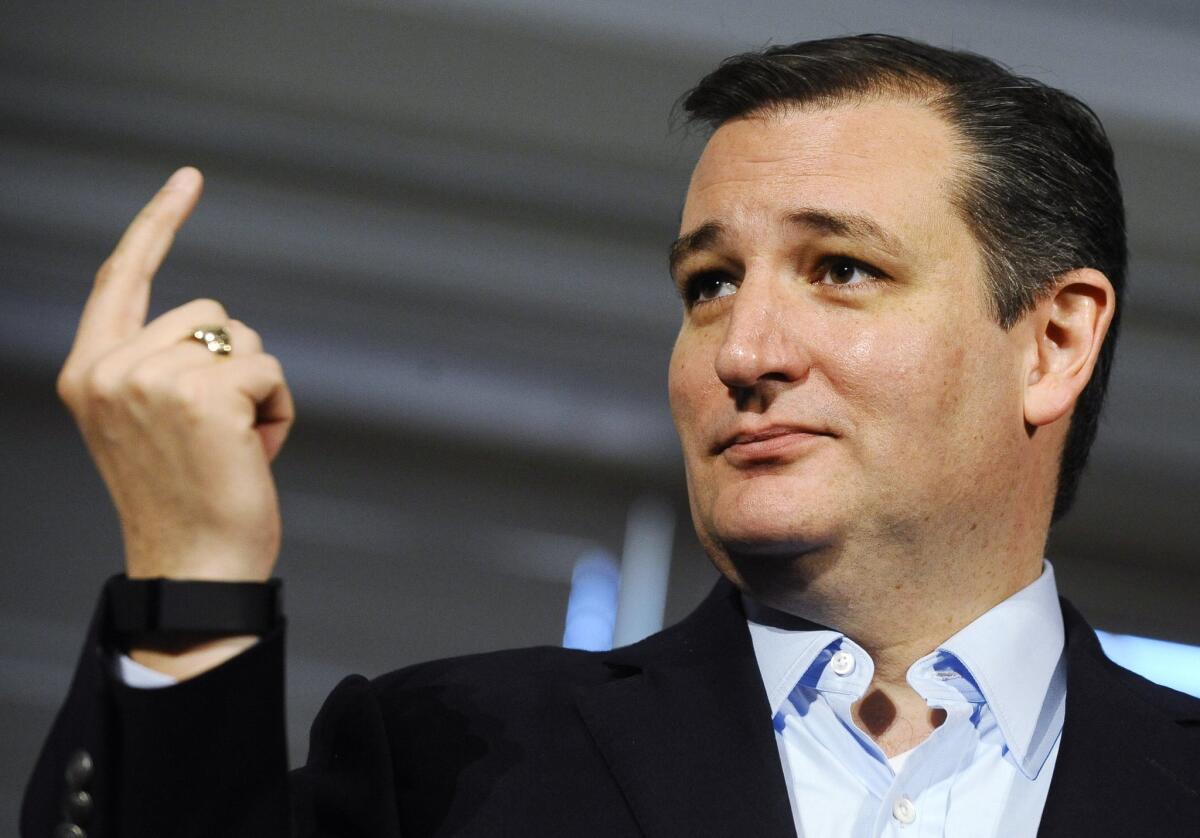
Republican presidential candidate Sen. Ted Cruz, R-Texas, speaks during a town hall meeting at Furman University on Monday, Dec. 7, 2015, in Greenville, S.C. (AP Photo/Rainier Ehrhardt)
As Republican leaders distanced themselves from Donald Trump’s proposal to ban Muslims, presidential candidate Ted Cruz was more measured in his disapproval, saying he was “not interested” in piling on.
“I disagree with that proposal. I like Donald Trump,” Cruz, the Texas senator, said at a news conference Tuesday. “A lot of our friends here have encouraged me to criticize and attack Donald Trump. I’m not interested in doing so.”
Cruz has gained traction in the presidential race by aligning close to Trump on many issues, positioning himself as most likely to inherit some of Trump’s support should the front-runner slip.
Cruz is beating Trump in Iowa, according to one new poll, and the senator unveiled his own plan Tuesday for a three-year ban on refugees entering the U.S. from Syria or other countries where Islamic State and other terrorist groups operate.
While Cruz reiterated that he does not believe Trump’s ban on Muslims is the “right solution,” he praised Trump for focusing on border security.
“Certainly in the media there has been no shortage of criticism for Donald Trump, and I do not believe the world needs my voice added to that chorus of criticism,” Cruz said, adding that the news media would “prefer that anyone running for president engage as an ongoing theater critic.”
“And listen,” Cruz said, “I commend Donald Trump for standing up and focusing America’s attention on the need to secure our borders.”
Paul Ryan: Trump's proposal 'is not conservatism'
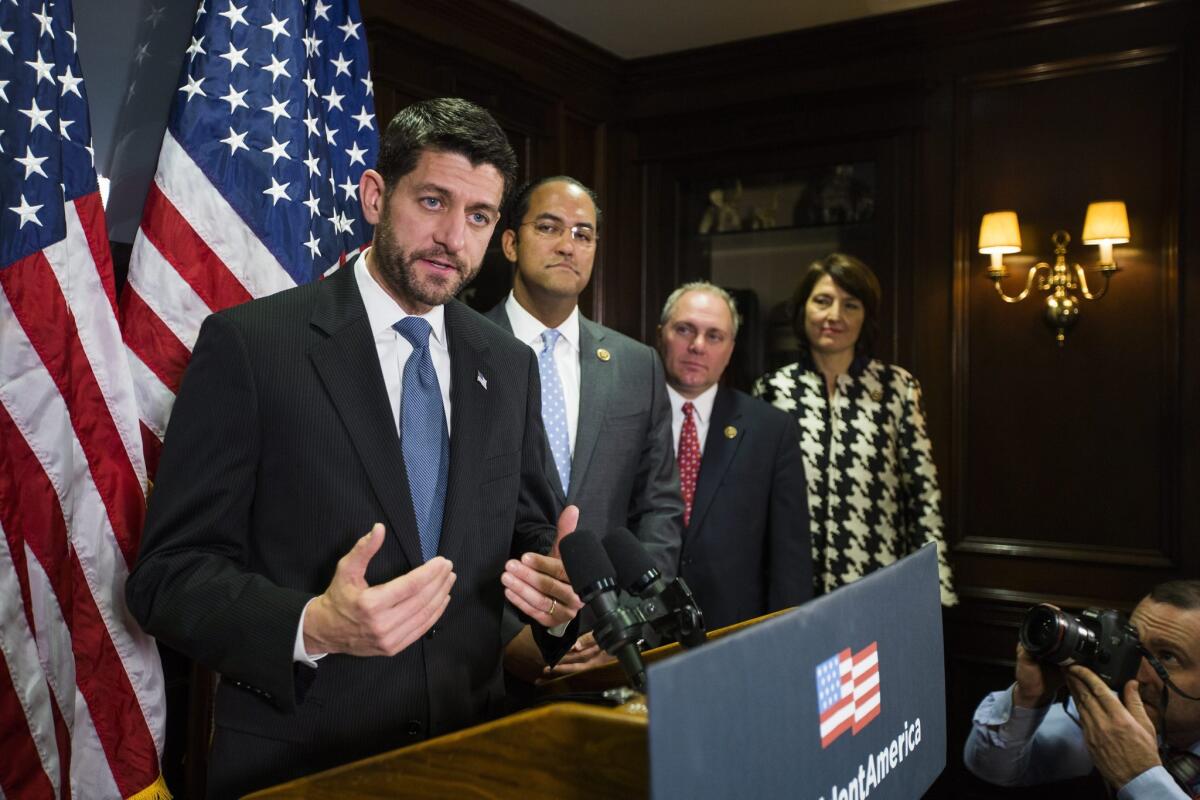
epa05060066 Republican Speaker of the House from Wisconsin Paul Ryan speaks about Republican presidential candidate Donald Trump’s comments calling to ban Muslims from entering the United States, in the RNC lobby near the US Capitol in Washington, DC, USA, 08 December 2015. Ryan told his fellow Republicans that Trump’s comments ‘are not who we are as a party.’ EPA/JIM LO SCALZO ** Usable by LA, CT and MoD ONLY **
House Speaker Paul D. Ryan (R-Wis.) slammed GOP presidential front-runner Donald Trump's proposal to bar Muslims from entering the U.S., saying Tuesday that it is "not who who we are."
"This is not conservatism .... This is not what this party stands for," Ryan said after a private meeting of House Republicans at the party's campaign headquarters.
Ryan, who had declined in recent weeks to comment on the presidential race, became one of the first top Republicans to speak out against Trump, though he did not name the candidate.
But the speaker also said he would ultimately back the party's nominee, demonstrating the paradox for leading Republicans who are watching Trump consistently favored by nearly a third of voters in primary polls.
"I'm going to support whoever the nominee is," Ryan said.
The comments came after Ryan made similar remarks privately to House Republicans at a routine campaign strategy session.
Trump defended his controversial proposal Tuesday, arguing that it wouldn’t be difficult to enforce.
Barring people of the Islamic faith would be as easy as interviewing them at entry points about their religious affiliation, Trump said.
“They would say, ‘Are you Muslim?’” Trump said on MSNBC’s "Morning Joe."
“It could happen at the site, it could happen here, it could happen at many different forums.”
Trump also cited the historical example of Franklin D. Roosevelt, who during World War II ordered people from enemy countries to register with the U.S. government as and for those of Japanese descent to be isolated in camps.
Trump said he would stop short of setting up camps.
“I am not proposing that,” Trump said. “You have to look at his presidential proclamations. It was tough stuff but it wasn't internment. We're not talking about Japanese internment camps. No, not at all.”
New ad for Bush attacks Cruz, Rubio, Trump
A new TV ad from a super PAC supporting Republican candidate Jeb Bush slams rivals Donald Trump and Sens. Ted Cruz and Marco Rubio, challenging voters to consider which candidate would best protect the United States in an attack and pointing to the 27 generals and admirals who support Bush, the former Florida governor.
“Will he be impulsive and reckless, like Donald Trump? Will he have voted to dramatically weaken counter-terrorism surveillance, like Ted Cruz? Will he have skipped crucial national security hearings and votes just to campaign, like Marco Rubio?” the ad asks of the next commander-in-chief.
Channels in Iowa, New Hampshire, South Carolina, and Nevada and Fox News national will air the ad, which released by super PAC Right to Rise USA, starting Tuesday.
Bush’s campaign has been mired in the low single digits in polling, and the ad reflects his struggle to strip support from Trump, Cruz and Rubio, all at or near the top of the race. It also comes a day after Trump controversially called for a ban on Muslim travel to the U.S., which Bush himself blasted as “unhinged."
Trump says U.S. will see more 9/11-type attacks if politicians don't act
After his sweeping call for a ban on Muslims entering the United States, claiming that all who practice Islam support jihad, GOP presidential front-runner Donald Trump spent Tuesday morning defending his assertions against the tide of disapproval that greeted his proposal.
Several Republican rivals vehemently denounced Trump’s plan — Sen. Lindsey Graham of South Carolina called him a “race-baiting, xenophobic religious bigot” on CNN on Tuesday.
But Trump insisted that he doesn’t care what his competitors think. He doubled down on his plan, saying that a widespread ban on Muslim immigration is the only way to keep the U.S. safe, citing last week’s attack in San Bernardino in which one of the assailants pledged support to Islamic State.
“Other people knew what they were doing and nobody reported it,” Trump said of the preparation of the San Bernardino assailants leading up last week’s attack. “[Politicians] used the excuse that they don’t want to be racial profilers.”
“You’re going to have many more World Trade Centers if you don’t solve it,” he warned during an interview with CNN on Tuesday , referring to the 9/11 attacks.
CNN anchor Chris Cuomo questioned Trump’s reference to poll numbers that claim Muslims support violence against people in the U.S. Trump cited a poll from the Center for Security Policy, run by Frank Gaffney, a former Reagan administration official whom the Southern Poverty Law Center has labeled "one of America’s most notorious Islamophobes."
Cuomo told Trump that Gaffney is a hack and not a trusted source of information. Trump, though, pushed forward with his point.
“Twenty-five percent of Muslims living in the United States agreed that violence against Americans here in the United States is justified as part of the global jihad,” he said, again citing Gaffney’s numbers.
The ban against travel would be temporary, Trump said. He suggested that President Obama also has a policy against Christian refugees, which Cuomo refuted.
"If you happen to be a Christian in Syria, it's almost impossible to come into this country," Trump said. "If you're a Muslim, you can get in.” Obama has ordered his administration to allow in at least 10,000 refugees from Syria this fiscal year; what religion they practice is not a part of what would determine whether they pass background checks.
Disgust for Trump went well beyond his GOP rivals. Even world renowned Harry Potter creator J.K. Rowling shared her disdain.
House speaker: Trump's call for ban on Muslims is 'not who we are'
It’s a tough thing. It’s tough. But you know, war is tough. And winning is tough. We don’t win anymore. We don’t win wars anymore. We don’t win wars anymore. We’re not a strong country anymore. We’re just so off.
Analysis: Trump's call to ban Muslims pushes the political debate far beyond usual bounds of discourse
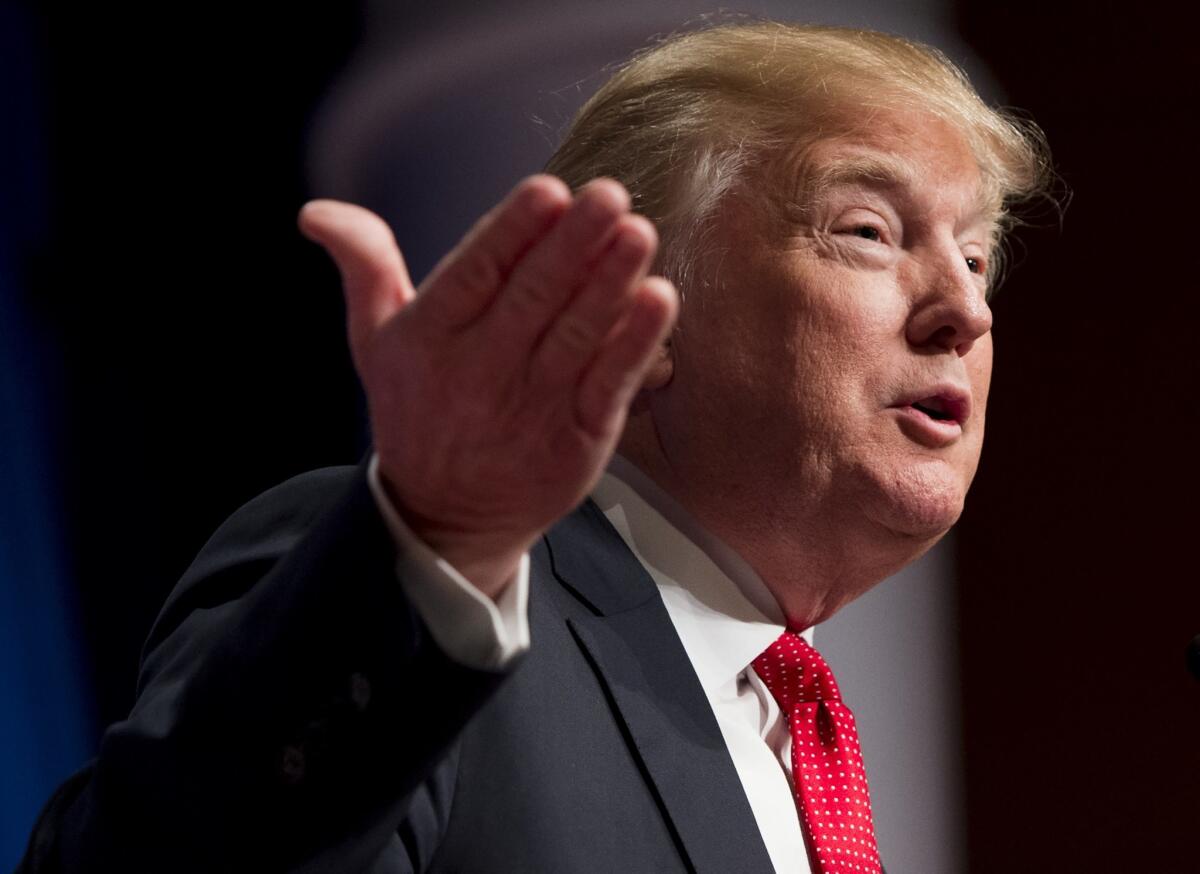
Republican presidential candidate Donald Trump.
Once more, with his unparalleled ability to provoke, the unsinkable Donald Trump has thrust himself to the fore of the 2016 presidential campaign, stoking a fierce debate over immigration, tolerance and the best means to fight terrorism.
The latest discord grew out of a two-paragraph statement Monday in which the Republican hopeful ignored legal niceties and hallowed tradition and called for “a total and complete shutdown of Muslims” entering the United States — in effect, imposing a religious test for people setting foot in America.
“Large segments of the Muslim population” are driven by a blind hatred, Trump said, and until and unless “we are able to determine and understand this problem and the dangerous threat it poses,” members of the Islamic faith must be kept from the country indefinitely.
The response was immediate and, by now, predictable.
By the numbers
Get the L.A. Times Politics newsletter
Deeply reported insights into legislation, politics and policy from Sacramento, Washington and beyond. In your inbox three times per week.
You may occasionally receive promotional content from the Los Angeles Times.



